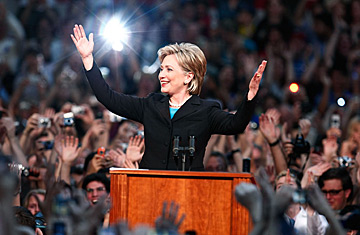
Hillary Clinton speaks to supporters at the National Building Museum, June 7, 2008 in Washington, DC, where she endorsed Barack Obama for president.
Linda Mahoney and her partner Edith Miller, both in their sixties, were among the first to line up to see Hillary Clinton end her bid for the presidency. Decked out in Hillary t-shirts and hats, the couple from Silver Spring also had printed signs pinned to their backs: "Remember in November to vote present."
Obama "is a mediocre Chicago machine politician and he will not stand up for us," said Mahoney, who added that she will never again give money or volunteer for the Democratic Party and plans to stay home in November. The couple both donated the maximum for Clinton and spent 23 days traveling to five states to work on her behalf. But, 10 minutes into Clinton's remarks Mahoney and Miller were heading for the door, refusing to hear Clinton's endorsement of Barack Obama.
"Now, when I started this race, I intended to win back the White House and make sure we have a President who puts our country back on the path to peace, prosperity and progress," Clinton told the crowd of several thousand gathered at Washington's National Building Museum. "And that's exactly what we're going to do, by ensuring that Barack Obama walks through the doors of the Oval Office on Jan. 20, 2009." The door swung shut behind Miller and Mahoney.
The crowd reacted with cheers, boos and hisses, — underlining the work that remains to be done in uniting the party. Clinton, in a black suit and blue shirt (perhaps unconsciously black and blue), repeated her endorsement of Obama eight more times, using his full name in each instance to underline the formality of her support. Each time Obama's name was mentioned, there was a mixed response. "Emotions are running high right now," said Ellen Malcolm, head of Emily's List, a non-profit group that works to elect Democratic women candidates and one of Clinton's strongest backers. "I don't think anyone's going to vote for John McCain in the fall. Given some time to grieve, they'll see the importance of electing a Democrat, Barack Obama, in November."
Clinton encouraged her fans to move on. "I want to say to my supporters: When you hear people saying or think to yourself, 'If only,' or, 'What if,' I say, please, don't go there. Every moment wasted looking back keeps us from moving forward," she said, her voice echoing throughout the cavernous room, just blocks from the White House. "Life is too short, time is too precious, and the stakes are too high to dwell on what might have been."
Clinton launched her bid for the White House on Jan. 20, 2007, promising to fight for many of the same things she named in her speech today: universal healthcare, retirement security and a vibrant economy. She made history as the only former First Lady to ever run for her husband's office. Today, Clinton for the first time openly spoke about the historic nature of her candidacy and the importance of continuing the struggle for equality of the sexes. "It would break my heart if, in falling short of my goal, I in any way discouraged any of you from pursuing yours," Clinton said to a crowd that was easily two-thirds women. "To build that future I see, we must make sure that women and men alike understand the struggles of their grandmothers and their mothers, and that women enjoy equal opportunities, equal pay, and equal respect."
Clinton also started the process of rebuilding her husband's legacy, a man whose missteps on the campaign trail have been controversial. "In the last 40 years, our country has voted 10 times for President. Democrats won only three of those times, and the man who won two of those elections is with us today," Clinton said, gesturing to her right where Bill sat in a dark grey suit. "We made tremendous progress during the '90s under a Democratic President, with a flourishing economy and our leadership for peace and security respected around the world."
It is a cliche in politics that sometimes concession speeches are so good, folks wonder why they hadn't seen this candidate all along. Think back to Al Gore in 2000 or John Kerry in 2004. On the campaign trail Clinton often got wonky; in Pennsylvania a staffer remarked to me that, though boring to reporters, this was the secret to her success with the middle class. Indeed, audiences, especially those who were economically depressed, paid rapt attention to her lists of proposed legislative acts. In leaving the race, Clinton left the lists at home and her rhetoric soared as high as any Obama speech, at times rousing the crowd and then quieting them down during poetic and poignant moments.
There's been a lot of speculation about what Clinton will do now. One task she has before her: helping to unify the Democratic Party and bring back into the fold supporters like Mahoney and Miller. Clinton made it clear she's not going anywhere. "I've had every opportunity and blessing in my own life, and I want the same for all Americans. And until that day comes, you'll always find me on the front lines of democracy, fighting for the future," she said, drawing one of the longest ovations of the speech. First Lady to New York Senator to presidential candidate, this is not the last we'll hear from Hillary Rodham Clinton.
